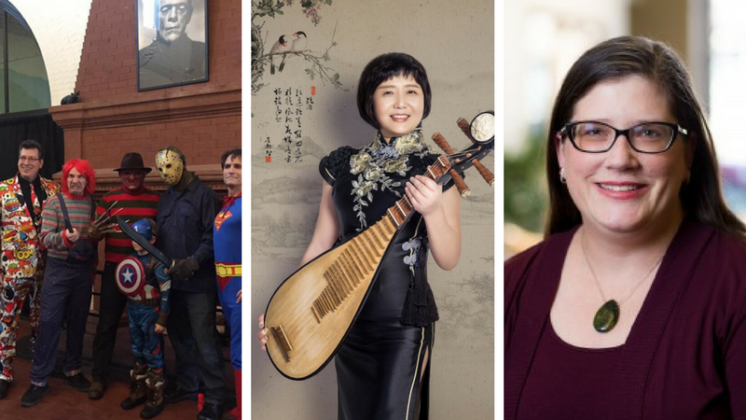Three Events: SuperMonster市City, Gao Hong and Sarah Deer
This past week, I went to see Gao Hong, Sarah Deer and Ed Downs give public talks, each a kind of rethinking for me.
SuperMonster市City
Downs talked as part of a panel for SuperMonster市City exhibit at the Duluth Depot. The panel was designed to introduce the crowd to the project of David Barnhill & Stephen Yogi Rueff celebrating Monsters, Superheroes & Villains in toys, commercials & more. Barnhill and Rueff were prepared to tell a story about boys’ daydreams — about the years when boys identified with Batman, with Frankenstein, with Spider-Man, with Luke Skywalker, with G. I. Joe.
Ed added an extra dimension — a sense that the media available to children shapes their responses to these stories — that identifying with Superman was easier when homes operated with media in one modality (the eye of the printed page, the ear of radio), but Star Wars explodes at a time when color TVs were common, the heroes flourished in the kind of technicolor vibrancy that TV made possible. And today, media is immersive and participatory — the story of the Monsters, Superheroes & Villains of today are more diverse and more complex than ever before. Ed’s insight was essential to understanding that it’s not just that we are attracted to the characters or the stories — the medium conditions our response. As I watch a season of the Flash in a weekend on DVD while my friends play the Flash in collectible card games and video games, I think about how media conditions my experience of my heroes. Thanks Ed.
Gao Hong
Gao Hong performed some amazing music on the pipa, a kind of lute. She played work from hundreds of years ago, she performed her own contemporary compositions, and she taught us about the pipa — it’s not just playing notes. It’s mimicking sounds. As such the songs are also stories — the pipa is a storytelling tool as well as a musical tool.
When she made the pipa sound like a clopping horse, like a laughing woman, like a rushing stream, I understood its power for storytelling and I felt the way it could enrapture a five year old in the back of the room and the retirees in the front alike.
On a personal note, when she said we were a good audience … there were not many of us, but we were good … I giggled to hear the loving judgment of my late mother-in-law from my first marriage in her voice.
When a student blushed and laughed because she was from the same province as Gao Hong, I loved it. How often does a student get to see themselves in that way in Duluth? It was magic.
Hong was brought to Duluth by money from the Legacy Amendment — our taxes at work — and by the extra special work of the office essential to UMD as a multicultural center for the Northland. This office both does amazing programming and supports student success — both of these efforts enrich the whole of Duluth.
Here is an unrelated Youtube Video of Gao Hong.
Sarah Deer
Finally, Sarah Deer gave a lecture as part of Women’s History Month at UMD. To explain how profoundly Sarah Deer’s work on rape and justice has changed my thinking, I have a kind of analogy:
Members of my family, the less charitable ones, used to define hunger as a charity problem. “Why do so many go hungry, and what should a Christian do about it?” (The answer was usually to give a relatively insignificant and yet absolving amount of money.) And I thought of it that way for a long time — it was a problem of poor people who needed sympathy.
…Until someone pointed out that so much food is wasted at every stage in the United States — wasted in the field, wasted in the processing, packaging or transit, wasted in the grocery or the restaurant, wasted in the home. If the question of hunger was rethought as a problem of eliminating food waste, a whole lot of options open up. You just need to take a different starting point.
Sarah Deer basically demonstrated, for me, that the question of rape has been framed badly for centuries — that in the American legal tradition, rape is essentially a property crime, and while significant popular opinion no longer reflects this way of thinking, the tinkering we do with the laws is limited by this framing of the question. We can and need to think the problem differently — and she offers indigenous legal traditions as a new way of thinking.
That hasn’t been easy, she argued, because we have mucked about, inhibited, damaged indigenous culture and legal systems in substantive ways. We can’t just look over the shoulder of our neighbor to copy their paper because (self-destructively) we broke their pencil before the exam started. But if we follow Deer’s example, we can look deeper, into traditions and norms outside our own, and we can understand rape differently. We don’t need to start with the mistakes of our EuroAmerican heritage.
There are so many days when I wish that were a bumper sticker. We don’t need to start with the mistakes of our EuroAmerican heritage.
Here is an unrelated Youtube Video of Prof. Deer.It
It was a good week.
Leave a Comment
Only registered members can post a comment , Login / Register Here











No Comments